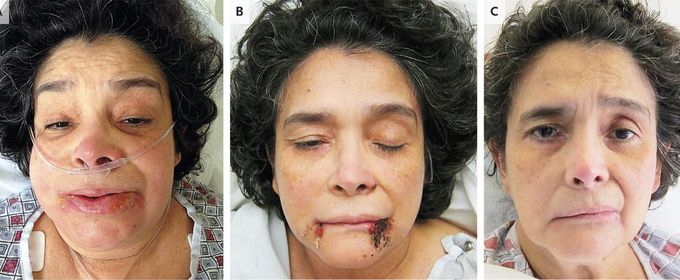


Herpes Labialis and Facial-Nerve Paralysis
A 65-year-old woman presented⁶ to the emergency department with odynophagia, facial edema, and perioral swelling with crusting blisters containing clear fluid (Panel A). One week earlier, she had completed one cycle of treatment with rituximab and bendamustine for chronic lymphocytic leukemia. In the emergency department, treatment with intravenous acyclovir was started for a clinical diagnosis of herpes labialis. With therapy, the facial edema resolved; the blistered lesions developed an eschar (Panel B) that resolved within 2 weeks. Two days after she started treatment with acyclovir, isolated paralysis of the right side of the face developed, as manifested by the inability to close the right eye fully (Panel B). She reported no loss of taste or hyperacusis. The patient was given a clinical diagnosis of Bell's palsy induced by herpes simplex virus. A diagnosis of the Ramsay Hunt syndrome was considered, but the patient did not have the characteristic vestibulocochlear symptoms. Several virally mediated causes of Bell's palsy are reported in the literature; the majority of cases are associated with herpes simplex virus or herpes zoster. Three months after her initial presentation, the patient had residual facial-nerve palsy (Panel C).

